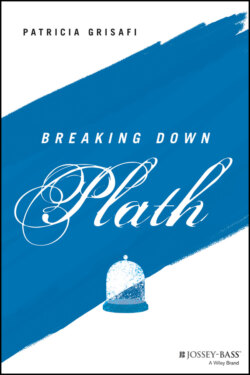Читать книгу Breaking Down Plath - Patricia Grisafi - Страница 15
GROWING AS A WRITER
ОглавлениеThe Colossus and Other Poems received good reviews, but Plath wanted more success and a room of her own. While in recovery from appendicitis, Plath began to plan her first novel as well as write more poetry. By 1961, she was deep at work on The Bell Jar, mostly keeping this project a secret. She and Hughes moved out of London and into the country to a house called Court Green where they would have more space to write. This was a turbulent time in Plath's life but also one of unbridled creativity. Plath was very prolific while at Court Green and somehow in between caring for her daughter, giving birth to her son, Nicholas, and finding out her husband was having an affair, she wrote with great urgency what would eventually become most of Ariel (1965), an extraordinary and genre‐changing collection of poems that would make Plath famous after its posthumous publication.
With the end of her marriage looming, Plath returned to London with her children to start life as a single parent. In January 1963, The Bell Jar was published under the pseudonym Victoria Lucas to mostly positive reviews—but unfortunately Plath did not live to see most of them. Plath had ambitions for her novel but deferentially referred to it as a “potboiler”—meaning a sensationalistic or shocking book. That she chose to publish under a pen name has been interpreted by scholars as evidence that Plath was concerned readers who were familiar with her story (such as friends or family) would see the text as purely autobiographical, since it is the story of a young woman who attempts suicide after an internship at a prestigious women's magazine. Plath wrote to her brother that it was a “secret” and “no one must read it!” To be fair, most of the people written about in The Bell Jar do not appear in a positive light—although this adds to the book's unexpected comedic power.
The winter of 1963 in London was one of the coldest to date. Plath had been thrown by the dissolution of her marriage and the prospect of life without Ted. She was alone in a country where she did not have a strong support system. And she was parenting two small children in a freezing apartment where things kept breaking. Though her depression had returned with a vengeance, Plath fought to stay optimistic and productive, but it was too hard. Her letters during this time show a woman continually reaching out to all her support systems but feeling entirely overwhelmed and heartbroken: “What appals [sic] me is the return of my madness, my paralysis, my fear & vision of the worst—cowardly withdrawal, a mental hospital, lobotomies,” she wrote to Dr. Beuscher (Letters Vol. 2, 2018, p. 967).
